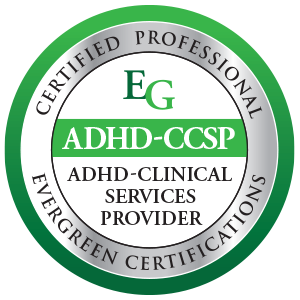Adult ADHD Coaching & Therapy
There are many myths and assumptions around ADHD. Some think it only applies to hyperactive boys, some believe ADHD in adults isn’t real, and some believe it doesn’t exist at all. Well, I am here to tell you that these are NOT truths. However, these myths and assumptions can make it difficult to find the right help, specifically for adults, including moms and dads with ADHD.
If you are an adult who has either been diagnosed with ADHD or an adult who has not yet been diagnosed, but are exploring the possibility that you have been living with ADHD, you may struggle with the following things:
• managing your time
• getting motivated
• feeling easily overwhelmed
• getting things done
• transitioning from one task to the next
• remembering information, even if you just learned the information
• maintaining energy and focus on a task once you have lost interest
• planning
ADHD affects all aspects of your life such as home, work, relationships, parenting, and your daily emotional experience.
And most people benefit from ADHD specific coaching or therapy, or both.
What is the difference between coaching and therapy?
Coaching is an important type of behavior-focused support for ADHD in children, parents of a child with ADHD, and ADHD in adults. Some of the things that ADHD coaches work with are highlighting your strengths, figuring out where your struggles are, and creating individualized workable goals to help you live your best life.
Not all ADHD coaches are therapists.
Therapy digs a little deeper. Living with undiagnosed or untreated ADHD as an adult may mean that you have been living with a lifetime of demoralization. Somehow you feel different from everyone else, and no one seems to understand how to help you.
It can provide healing from the emotional trauma, or a negative believe system you may have about yourself, allowing you to create a stronger sense of self.
How to decide if you need coaching, therapy, or both:
Coaching– strategies for living better, organization, planning, getting things done, relating to the important people in your life.
Therapy– self-esteem, depression, anxiety, toxic relationships, setting boundaries, self-care, complete acceptance of your neurodiversity.
Both- if you are working with a therapist and you need strategies, then you need a coach.
If you are working with a coach on strategies and systems to help you get things done, but you are still struggling with “self-loathing “and frustration about being “different”, then also working with a therapist is a good idea.
* I currently do not accept insurance but I can provide a superbill for you to submit for out-of-network reimbursement. I do accept HSA credit cards and all other major credit cards, cash, and checks.
Under the “No Surprises Act”, mental health clinicians that are out-of-network are required to provide notice of the Good Faith Estimate – click here for the notice.
